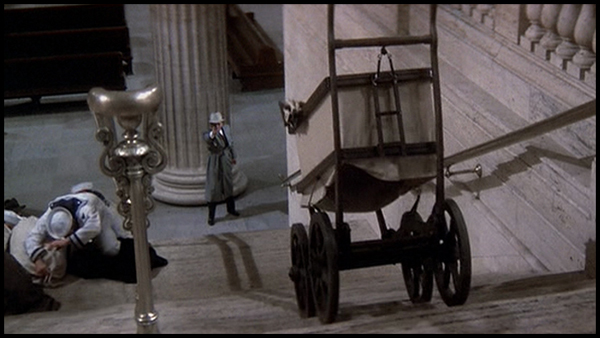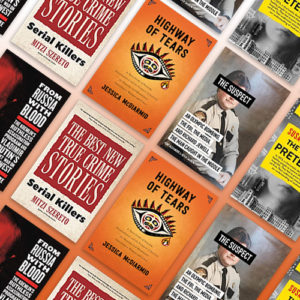Otto Penzler ranks, analyzes, & celebrates the 106 greatest crime films of all-time. Catch up on the series and find new installments daily here.
__________________________________
The Untouchables (1987)
__________________________________
TYPE OF FILM: Crime
STUDIO: Paramount
PRODUCER: Art Linson
DIRECTOR: Brian De Palma
SCREENWRITER: David Mamet
SOURCE: The Untouchables television series, which was based on The Untouchables, a true crime book by Oscar Fraley
RUNNING TIME: 119 minutes
PRINCIPAL PLAYERS:
Kevin Costner…………………………………………………………………………….Eliot Ness
Sean Connery…………………………………………………………………………James Malone
Charles Martin Smith………………………………………………………….……Oscar Wallace
Andy Garcia…………………………………………………………………………..George Stone
Robert De Niro…………………………………………………………………….……Al Capone
Richard Bradford…………………………………………………………………………..….Mike
Jack Kehoe……………………………………………………………………………Walter Payne
Brad Sullivan……………………………………………………………………………..…George
Billy Drago………………………………………………………………………..…….Frank Nitti
Patricia Clarkson……………………………………………………………………Catherine Ness
__________________________________
DID YOU KNOW?
__________________________________
Purportedly based on real-life events, The Untouchables is three steps removed from reality. First, Oscar Fraley wrote a book called The Untouchables. It was written in collaboration with Eliot Ness, who made every effort to glamorize and glorify the role played by himself and his team in bringing the gangsters of Chicago to their knees. This was picked up and adapted for a television series, starring Robert Stack, which enjoyed great popularity from 1959 to 1963. In order to sustain a weekly series for five years, new exploits, new villains and new acts of derring-do had to be invented. By the time the film was written (by David Mamet, who no one has ever accused of being a journalist), it became virtually impossible to know how many, if any, of the depicted adventures had ever actually happened.
__________________________________
THE STORY
__________________________________

Chicago in 1930 is owned by Al Capone, who controls the mob and the liquor business and has stayed in power by having the police, judges, and powerful city officials on his payroll. A special U.S. Treasury agent, Eliot Ness, is assigned to bring down Capone and his gangsters. On his first big raid, cases of what were expected to be illicit liquor turn out to contain nothing of value, as the gangsters obviously had been warned by corrupt cops.
Ness builds his own small unit of men he can trust, beginning with Jim Malone, an elderly cop who continues to walk a beat because he won’t be corrupted. They go together to the police academy and recruit its best sharpshooter, an Italian from the South Side who has renamed himself George Stone. When Oscar Wallace, an apparently meek bookkeeper appears, confident that he can nail Capone for income-tax evasion, he, too, is added to the group, which the newspapers begin to call The Untouchables.
The special agents raid a large warehouse full of booze, infuriating Capone, who says he wants Ness and his entire family killed. On the next big job, they join with the Royal Canadian Mounted Police to capture ten trucks full of liquor coming across the border, along with the money that was to pay for it. More importantly, they seize a set of coded ledgers that list those on Capone’s payroll and show large earnings for the gangster. After a shootout in which virtually all of the gangsters are killed, the agents try to get one of Capone’s bookkeepers to decode the ledger, without success, until Malone, the wise old Irish cop, goes outside the cabin in which they have been meeting. He lifts one of the already slain gangsters against the window and yells at him to talk, putting a gun in his mouth and threatening to shoot if he won’t. At the count of three, he pulls the trigger, inducing the terrified bookkeeper to offer to tell everything he knows. The Mountie, unaware that the gangster was already dead, tells Ness that he doesn’t approve of his methods. “Well,” Ness responds, “you’re not from Chicago.”
In a bold move at the police station, Capone’s henchman, Frank Nitti, kills the captured bookkeeper and Oscar, causing Ness to confront Capone. They exchange threats. Nitti then goes after Malone at his apartment and kills him in a hail of machine-gun fire, but not before the dying cop lets Ness know where Capone’s personal bookkeeper is, to be rushed out of town by train. Ness and Stone capture him and bring him to court, where he has agreed to testify. Capone is unconcerned and Ness deduces that the jury has been bribed, so he coerces the judge to switch juries. Nitti, in the courtroom with a gun, is chased to the roof by Ness, where Nitti taunts the FBI agent by telling him that Malone squealed like a stuck pig when he died. Ness throws him from the roof, and as Nitti screams on his plunge, Ness yells after him, “Did he sound anything like that?” Capone is sentenced to eleven years. Outside the courtroom, a reporter informs Ness that Prohibition has been repealed and asks what he’ll do then. He says, “I think I’ll have a drink.”
***
Kevin Costner, as stone-faced as Harrison Ford, is perfectly cast as the straight-arrow, grown-up Boy Scout who wants to do good, and Robert De Niro is compelling as a flamboyant Al Capone, but it is Sean Connery who steals the movie. One can quibble with the fact that he’s an old Irish cop who happens to have a Scottish accent, but one wonders how a cop consigned to a beat for so many years can know so much about Al Capone’s business, where his secret warehouses of liquor are, why he is so intimate with the top brass of the department, and other stretches of imagination. However, his performance as a straightforward man of courage and action was good enough to earn him a deserved Academy Award for Best Supporting Actor.
If the film has a negative, it is the excessive amount of blood that Brian De Palma felt necessary. A single gunshot to the forehead had an entire side of an elevator covered (not splattered—covered) with blood, all the way to the ceiling. The violence with which Capone smashes the skull of one of his henchmen with a baseball bat (obviously lifted directly from Party Girl, a 1958 gangster movie made by Nicholas Ray) is so bloody that the other gangsters turn away in disgust!
__________________________________
BEST LINE
__________________________________
Jim Malone is in his apartment when one of Capone’s thugs breaks in and sneaks up on him with a knife in his hands. Malone turns around with a large gun and smiles. “Isn’t that just like a wop,” he says. “Brings a knife to a gunfight.”


















